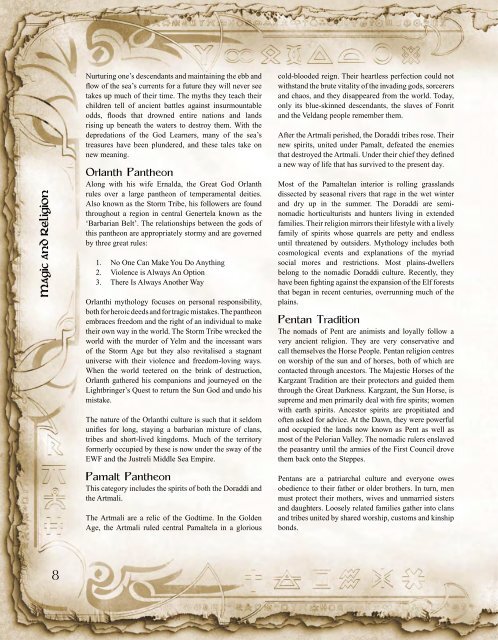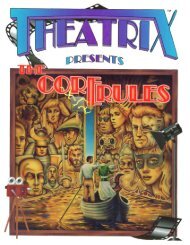Cults of G.. - Index of - Free
Cults of G.. - Index of - Free
Cults of G.. - Index of - Free
You also want an ePaper? Increase the reach of your titles
YUMPU automatically turns print PDFs into web optimized ePapers that Google loves.
Magic and Religion<br />
8<br />
Nurturing one’s descendants and maintaining the ebb and<br />
flow <strong>of</strong> the sea’s currents for a future they will never see<br />
takes up much <strong>of</strong> their time. The myths they teach their<br />
children tell <strong>of</strong> ancient battles against insurmountable<br />
odds, floods that drowned entire nations and lands<br />
rising up beneath the waters to destroy them. With the<br />
depredations <strong>of</strong> the God Learners, many <strong>of</strong> the sea’s<br />
treasures have been plundered, and these tales take on<br />
new meaning.<br />
Orlanth Pantheon<br />
Along with his wife Ernalda, the Great God Orlanth<br />
rules over a large pantheon <strong>of</strong> temperamental deities.<br />
Also known as the Storm Tribe, his followers are found<br />
throughout a region in central Genertela known as the<br />
‘Barbarian Belt’. The relationships between the gods <strong>of</strong><br />
this pantheon are appropriately stormy and are governed<br />
by three great rules:<br />
1. No One Can Make You Do Anything<br />
2. Violence is Always An Option<br />
3. There Is Always Another Way<br />
Orlanthi mythology focuses on personal responsibility,<br />
both for heroic deeds and for tragic mistakes. The pantheon<br />
embraces freedom and the right <strong>of</strong> an individual to make<br />
their own way in the world. The Storm Tribe wrecked the<br />
world with the murder <strong>of</strong> Yelm and the incessant wars<br />
<strong>of</strong> the Storm Age but they also revitalised a stagnant<br />
universe with their violence and freedom-loving ways.<br />
When the world teetered on the brink <strong>of</strong> destruction,<br />
Orlanth gathered his companions and journeyed on the<br />
Lightbringer’s Quest to return the Sun God and undo his<br />
mistake.<br />
The nature <strong>of</strong> the Orlanthi culture is such that it seldom<br />
unifies for long, staying a barbarian mixture <strong>of</strong> clans,<br />
tribes and short-lived kingdoms. Much <strong>of</strong> the territory<br />
formerly occupied by these is now under the sway <strong>of</strong> the<br />
EWF and the Justreli Middle Sea Empire.<br />
Pamalt Pantheon<br />
This category includes the spirits <strong>of</strong> both the Doraddi and<br />
the Artmali.<br />
The Artmali are a relic <strong>of</strong> the Godtime. In the Golden<br />
Age, the Artmali ruled central Pamaltela in a glorious<br />
cold-blooded reign. Their heartless perfection could not<br />
withstand the brute vitality <strong>of</strong> the invading gods, sorcerers<br />
and chaos, and they disappeared from the world. Today,<br />
only its blue-skinned descendants, the slaves <strong>of</strong> Fonrit<br />
and the Veldang people remember them.<br />
After the Artmali perished, the Doraddi tribes rose. Their<br />
new spirits, united under Pamalt, defeated the enemies<br />
that destroyed the Artmali. Under their chief they defined<br />
a new way <strong>of</strong> life that has survived to the present day.<br />
Most <strong>of</strong> the Pamaltelan interior is rolling grasslands<br />
dissected by seasonal rivers that rage in the wet winter<br />
and dry up in the summer. The Doraddi are seminomadic<br />
horticulturists and hunters living in extended<br />
families. Their religion mirrors their lifestyle with a lively<br />
family <strong>of</strong> spirits whose quarrels are petty and endless<br />
until threatened by outsiders. Mythology includes both<br />
cosmological events and explanations <strong>of</strong> the myriad<br />
social mores and restrictions. Most plains-dwellers<br />
belong to the nomadic Doraddi culture. Recently, they<br />
have been fighting against the expansion <strong>of</strong> the Elf forests<br />
that began in recent centuries, overrunning much <strong>of</strong> the<br />
plains.<br />
Pentan Tradition<br />
The nomads <strong>of</strong> Pent are animists and loyally follow a<br />
very ancient religion. They are very conservative and<br />
call themselves the Horse People. Pentan religion centres<br />
on worship <strong>of</strong> the sun and <strong>of</strong> horses, both <strong>of</strong> which are<br />
contacted through ancestors. The Majestic Horses <strong>of</strong> the<br />
Kargzant Tradition are their protectors and guided them<br />
through the Great Darkness. Kargzant, the Sun Horse, is<br />
supreme and men primarily deal with fire spirits; women<br />
with earth spirits. Ancestor spirits are propitiated and<br />
<strong>of</strong>ten asked for advice. At the Dawn, they were powerful<br />
and occupied the lands now known as Pent as well as<br />
most <strong>of</strong> the Pelorian Valley. The nomadic rulers enslaved<br />
the peasantry until the armies <strong>of</strong> the First Council drove<br />
them back onto the Steppes.<br />
Pentans are a patriarchal culture and everyone owes<br />
obedience to their father or older brothers. In turn, men<br />
must protect their mothers, wives and unmarried sisters<br />
and daughters. Loosely related families gather into clans<br />
and tribes united by shared worship, customs and kinship<br />
bonds.



